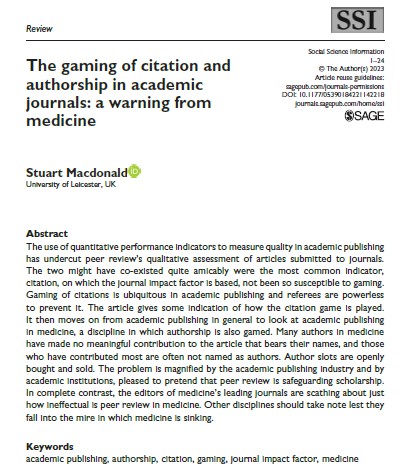The Gaming of Citation and Authorship
About ten days ago I wrote a piece about authorship of scientific papers in which I pointed out that in astrophysics in cosmology it is often the case that many “authors” (i.e. people listed in the author list) of papers (largely those emanating from large consortia) often haven’t even read the paper they are claiming to have written.
I now draw your attention to a paper by Stuart Macdonald, with the abstract:
You can find the full paper here, but unfortunately it requires a subscription. Open Access hasn’t reached sociology yet.
The paper focuses on practices in medicine, but it would be very wrong to assume that the issues are confined to that discipline; others have already fallen into the mire. I draw your attention in particular to the sentence:
Many authors in medicine have made no meaningful contribution to the article that bears their names, and those who have contributed most are often not named as authors.
The first bit certainly also applies to astronomy, for example.
The paper does not just discuss authorship, but also citations. I won’t discuss the Journal Impact Factor further, as any sane person knows that it is daft. Citations are not just used to determine the JIF, however – citations at article level make more sense, but are also not immune from gaming, and although they undoubtedly contain some information, they do not tell the whole story. Nor will I discuss the alleged ineffectiveness of peer review in medicine (about which I know nothing). I will however end with one further quote from the abstract:
The problem is magnified by the academic publishing industry and by academic institutions….
So many problems are…
The underlying cause of all this is that the people in charge of academic institutions nowadays have no concept of the intrinsic value of research and scholarship. The only things that are meaningful in their world are metrics. Everything we do now is reduced to key performance indicators, such as publication and citation counts. This mindset is a corrupting influence encourages perverse behaviour among researchers as well as managers.

February 22, 2023 at 9:26 am
Very interesting. Institutes that sign up to DORA state they will not use journal IFs as a metric, but I don’t think it says anything about citations. Some have argued that if a paper receives no citations it means it makes no impact, but that does not mean it does not contain important results. Also if the paper contains data which ends up in a database, the database will likely be referenced rather than the paper. There is also the complication that citation rates not only vary greatly with discipline, but also sub-discipline, and even sub-sub-discipline. (As I frequently pointed out to people when working on RAE/REF preparations).
February 22, 2023 at 9:42 am
Yes, citation numbers carry some information but they don’t represent everything about a piece of work.
February 22, 2023 at 9:55 am
When in the past I have interviewed people for lectureships, when it came to papers I would be interested in their leadership role in the research, and what their specific contributions were. I’d look at citations (if provided by the applicant), but was always aware that citation rates can vary massively between research topics.
February 22, 2023 at 10:37 am
They vary a lot across different branches of astronomy, and even more between different disciplines.
February 22, 2023 at 11:19 am
> This certainly also applies to astronomy, for example.
This comment bothers me. I accept that in some cases there is little meaningful direct contribution from co-authors to papers, but I do not think it is that widespread in astrophysics (except in very large consortia).
But it was more the second part that I found disturbing “those who have contributed most are often not named as authors”. I hope that is almost never the case in astrophysics.
February 22, 2023 at 8:36 pm
“Many authors in medicine have made no meaningful contribution to the article that bears their names, and those who have contributed most are often not named as authors.
This certainly also applies to astronomy, for example.”
Research is not only ideas, but work and resources.
Suppose I get an idea, then — in both Medicine & Astronomy — I will likely need access to considerable resources (say computing or telescopes or data or laboratory space) to show my idea has merit.
Should the provider of funds or resources or laboratory space or data be on the papers that come from my idea?
In modern astronomy and medicine, the answer is often yes. Given the provider of resources will need to justify the spending to a funding agency, this becomes a symbiotic relationship. The resources provider will then be able to point to the papers to justify still more funding for resources to follow up the idea.
So, I agree some authors may not have contributed actual words or ideas to the paper. But, they will have contributed something.
By contrast, I don’t think I have ever encountered an example in astronomy in which “those who have contributed most are often not named as authors.”
I would hope that never happens.
February 23, 2023 at 3:36 pm
An author is also someone who can hold up the hand and take responsibility for their part of the paper. It can also be for instance that the instrument worked or the data was correctly calibrated. There should be a contribution, but it does not have to be in the writing of the paper.